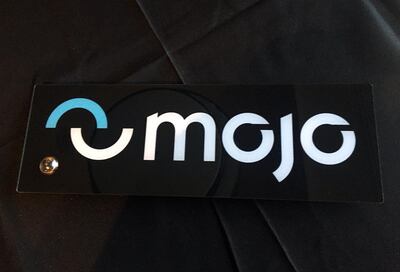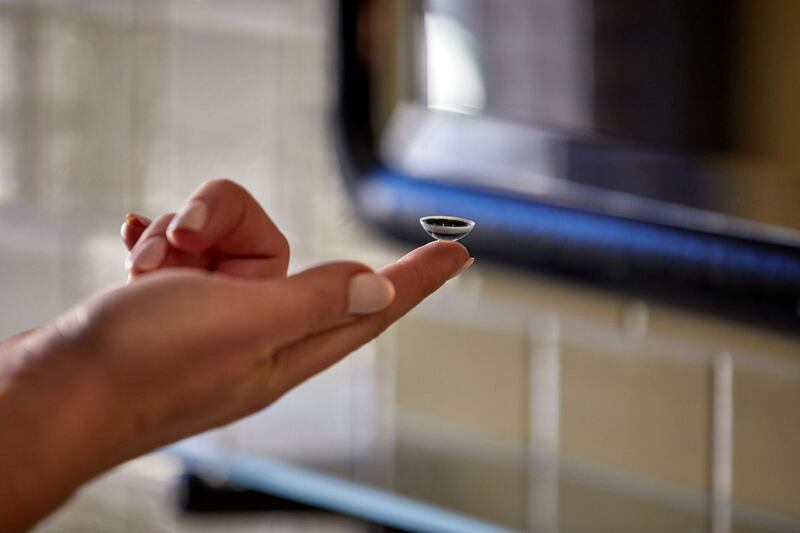One California start-up appears to have a clear vision for a world without smartphones and it means linking Internet access even closer to human anatomy - potentially disrupting the $900 billion (Dh3.3tn) smartphone device and services business.
Showcased at CES 2020 earlier this month, Mojo Vision has spent the past five years working on a prototype for augmented reality (AR) contact lenses, backed by an impressive $108 million of venture capital funding, including backing from Google.
The idea of using electronics to enhance the human body's abilities has been a core science fiction theme since science fiction novels of the 1960s, becoming mainstream with the seventies TV series The Bionic Man. With the superhuman capabilities of the Bionic Man's digital eye - or the later Terminator’s 'Termovision' - night vision, facial recognition and instant access to information is not such a leap for the modern imagination.
These days, humans depend on access to instant data. Regardless of how often you look at the screen, your smartphone is probably by your side 24 hours a day. As technology entrepreneur Elon Musk says, we're already cyborgs!
But Mojo Vision wants to take that a big leap forward. Although still a few years away from producing a viable product, the smart contact lens could provide the ultimate AR experience. Users will be able to access smart menus in their peripheral vision, selecting a feature by simply focusing on it. The lenses could be put to an almost infinite number of uses, such as telling you how long it will take you to walk to a distant building, checking your heart-rate, reading your latest instant message or viewing the choice of restaurants and lunch menus around your current location.
Over the last decade, the technology required to augment human vision has started to become feasible. Google first started talking about its augmented reality glasses project in 2007, extolling the future benefits and going so far as to say that 'Project Glass' was the future of Google. Its Glass brand products display digital information in the lenses, connect to the Internet and are controlled by the wearer's voice commands.
Google Glass provided a vision for the future of augmented reality which has inspired a new generation of technology developers. However, despite delivering a working product and piloting it with a wide range of industries, the glasses themselves haven’t really changed the world.
But as we've seen throughout the past fifty years, the electronics industry is driven by the mantra 'smaller, faster, cheaper'. Compaq's 1983 industry standard portable computer weighed in at 13 kilos and cost nearly $3,600 (Dh13,200) at the time (more than $9,000 in today's money). Fast forward to today's technology and we carry the equivalent processing power of a 1980s supercomputer in our pockets in the form of a relatively affordable smartphone.
Smaller, faster, cheaper is now a way of life and so few will be surprised that AR vision is about to downsize to 14-millimeter lenses.
What this will mean for the world's $900 billion US dollar smartphone economy? Mojo believes that, in time, smart contact lenses will dramatically reduce our dependence on smartphone screens. It seems unlikely that consumers will be in a rush to ditch their mobiles, but as AI voice becomes more important as an interface, our device needs are sure to change.

Mojo Vision's concept has already received a 'Breakthrough Device Designation' from the US Food and Drug Administration, meaning Mojo is likely to secure a special priority review once a working product is ready. FDA approval would not only open the door to disrupting a huge medical device business, helping to change the lives of people that are hearing or visually impaired, but could also provide a useful stamp of approval in advance of marketing Mojo products to everyday consumers.
As with all technology breakthroughs, smart contact lenses could herald both unprecedented benefits for consumers and previously unimaginable risks. Future products may bring exciting new dimensions to work, life and education, providing valuable, in-the-moment information and context to any real-life situation that you can possibly think of.
However, many current concerns with data privacy, cybersecurity and intrusive advertising could well apply to smart contacts. If hackers are able to hack smartphones, home networks and Amazon's Ring security systems, then it stands to reason that these will become a target as well.
So, there are good reasons for the developer to proceed carefully in bringing the right product to market. After all, a hacked lens might lead you to unintentionally reveal some of your most intimate secrets, including, say, your ATM pin or online banking password.
Carrington Malin is an entrepreneur, marketer and writer who focuses on emerging technologies







